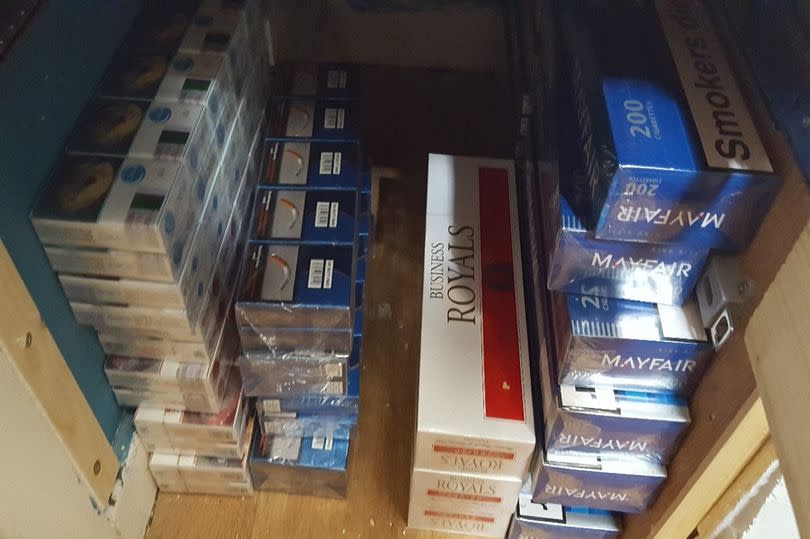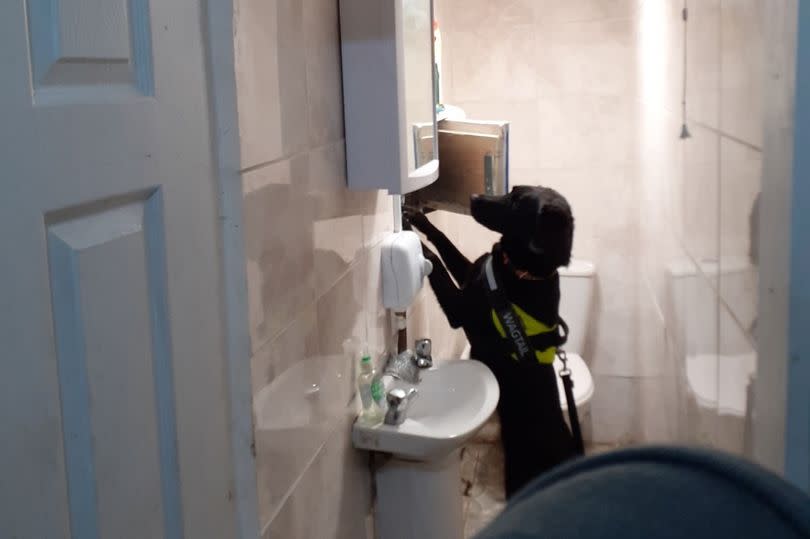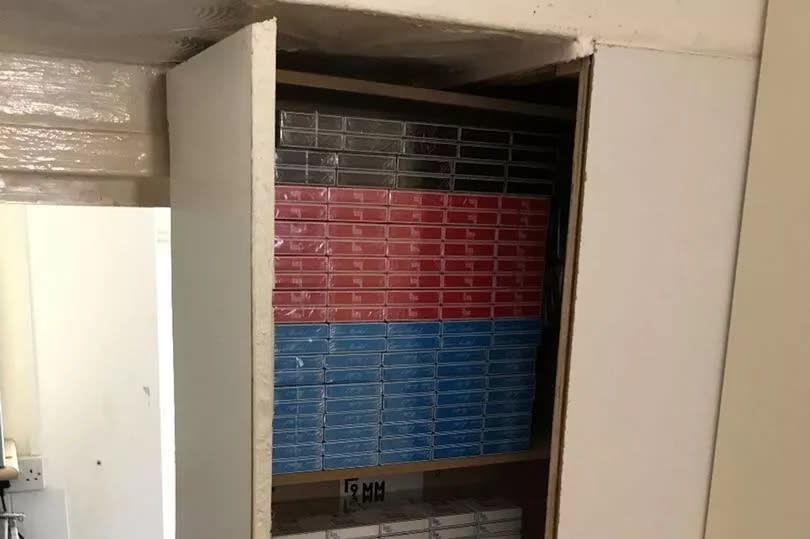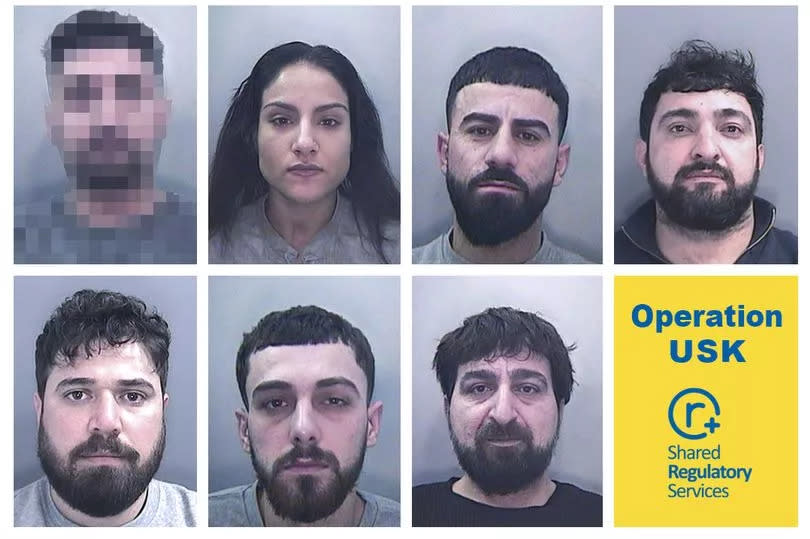Organised crime group made millions selling illegal cigarettes

A criminal gang was running a multi-million-pound operation selling counterfeit cigarettes and nitrous oxide canisters through a network of shops. The gang employed a range of techniques to hide their illicit stock including hidden storage compartments and in some cases by taking control of the flats above the businesses and linking them to the stores with secret winches and chutes.
Swansea Crown Court heard the operation was running for years and involved "at least" eight corner shops and convenience stores with each establishment said to be making £1,000 or more profit per day. The court heard it was impossible to put a definite value on the fraud as much of the enterprise was carried on in cash and with no paper trail but as an example of the scale of the enterprise tobacco worth £600,000 was seized during a series of enforcement raids and more than £1.8m in cash was laundered through various bank accounts liked to the defendants.
The court heard that as well as numerous secret compartments in shops the gang was keeping stocks of tobacco at some of their homes – including in one case in a concealed storage facility that was only accessible via a children's bedroom – as well as in vehicles and in self-storage units. Some of the compartments were opened and shut via remote control-operated electromagnets and were so well hidden behind walls and in ceilings that they were only found thanks to specially-trained sniffer dogs.
READ MORE: Gang of burglars travelled from Bristol to Welsh farm after seeing Facebook advert
Prosecution barrister Lee Reynolds said: "This was an extremely determined organised criminal group set up and run to sell illegal tobacco and nitrous oxide in the south Wales area – predominantly Cardiff, Barry, and Bridgend. It was extremely lucrative and premises were taking more than £1,000 per day based on the evidence. There were at least eight shops involved in this case and a number of other premises and locations used to support the illegality. Most of the business was conducted in cash. Those involved, particularly in a senior role, have displayed a complete disregard for the law and knowingly continued to trade despite previous advice, intervention, and court proceedings."
The prosecutor said most of the employees in the shops were failed asylum seekers who were not permitted to work in the UK and who received cash for their employment. He said they were rarely named on any documents and were circulated between the different shops making it difficult to identify and trace them. The staff also often used several variations of their names and dates of birth and the prosecutor said "to some extent" they were exploited by those at the top of the organisation.

The court heard that as the operation continued and developed over the years increasing efforts were made to avoid detection with most of the shops being fitted with large concealed storage spaces held shut with powerful electromagnets which could only be opened by remote control units. The prosecutor said many of these hidden spaces could only be identified by sniffer dogs or by physically breaking down the walls. In some cases tobacco was stored in freezers to cut down on the aroma and there were also attempts to mask the smell with the use of chilli powder.
The court heard that in many cases the defendants were in control of the flats above the shops and they connected the flats to the stores below with large concealed tubes or electronic winches meaning stock stored in the flats could quickly be delivered to the shops without anyone seeing. The operation also used self-storage units to keep large quantities of illicit tobacco products and those involved in running the enterprise would often move stock around under cover of darkness.
The operation against the organised crime gang – codenamed Operation Usk – began in February 2020 following intelligence that several shops in the south Wales area were selling illegal tobacco and canisters of nitrous oxide or laughing gas. Investigators eventually identified a number of stores which were involved in the fraud including: Best European Food Ltd in Clifton Street, Cardiff; Laz Mini Market in Clifton Street, Cardiff; Barry Stores in Tynewydd Road, Barry; European Shop in Holton Road, Barry; World and Food Ltd in Holton Road, Barry; Apna Bazaar Bridgend Ltd in Dunraven Place, Bridgend; and European Mini Market in Tudor Street, Cardiff. Investigators also identified bank accounts linked to some of the players in the gang through which hundreds of thousands in cash flowed. In total more than £1.8m had been laundered that way.

The prosecutor said placing a value on the fraud was difficult as it was was a "lucrative cash business" conducted over a lengthy period and he said it was the prosecution case that cash was banked on behalf of the organisation only when it had to be – for example to pay bills or purchase cars or houses. He said a "conservative" calculation of the value of the fraud would be more than £3.8m but the court may think that a "fair and proportionate figure" for the purpose sentencing would be in the region of £2m.
Ali Khaleel Hassan Aldarawish, aged 34, formerly of Malvern Terrace, Brynmill, Swansea, but now of Albany Road, Roath, Cardiff; Shwan Kamal Sofizada, aged 32, of Caeglas Road, Rumney, Cardiff; Abdulla Laksari, aged 37, from Alice Street, Butetown, Cardiff; Farhard Sofizadeh, aged 32, of High Street, Barry; Saman Abobakir Sedik, aged 45, of High View Bridgend; Karwan Mohammadi, aged 31, of Canton Court, Riverside, Cardiff; Mariwam Mohammed, aged 38, of Gold Street, Adamsdown, Cardiff; Aiysha Bibi, aged 24, of High Street, Barry; Rebin Hatam Ahmed, aged 32, of Drayton Street, Walsall; and 23-year-old Alan Abdullah of Fleetwood Road, Leicester, had all previously pleaded guilty or been convicted at trial of carrying out a business for a fraudulent purpose when they appeared in the dock for sentencing. Aldarawish, Shwan Sofizada, Laksari, and Sedik had also previously been convicted of money laundering.

Aldarawish was sentenced to seven years in prison, Shwan Sofizada to six years in prison, Laksari to six years in prison, Farhard Sofizadeh to three years in prison, and Sedik to three years in prison The defendants will serve up to half those sentences in custody before being released on licence to serve the remainder in the community.
Mohammadi was sentenced to two years in prison suspended for 12 months and was ordered to do 150 hours of unpaid work while Mohammed was sentenced to 19 months in prison suspended for 12 months and was ordered to do 150 hours unpaid work and a rehabilitation course and Bibi was sentenced to two years in prison suspended for 18 months and was ordered to do a rehabilitation course. Ahmed was sentenced to 19 months in prison suspended for 12 months and was ordered to do 100 hours of unpaid work and a rehabilitation course and Abdullah was sentenced to two years in prison suspended for 12 months and was ordered to do 100 hours of unpaid work and a rehabilitation course.
Speaking after the hearing Helen Picton, head of shared regulatory services for Cardiff, Bridgend, and Vale of Glamorgan councils, said: "Searches and test purchases at all seven shops resulted in £600,000 of illegal tobacco taken off the streets of south Wales. This is a mere fraction of the criminality in this case as it doesn’t consider any cigarettes or tobacco that were sold by the criminal gang. Although they thought they were operating with impunity what they didn’t know is that they were being monitored and, as the two trials showed, there was overwhelming evidence for the juries to find them guilty of these offences. It was clear from the investigation that they believed they were entitled to carry out their fraudulent business and showed little remorse.
"‘Illegal tobacco does great harm in the community. Its cheapness and ease of supply are particularly attractive to young people and others on lower incomes and it eliminates the price incentive for existing smokers to quit the habit. I’m delighted to see the successful conclusion of this long and extended investigation. Offenders need to know that they will face consequences if they choose to deal in these illegal products."
This interactive tool allows you to check the latest crime statistics for your area

 Yahoo News
Yahoo News 
